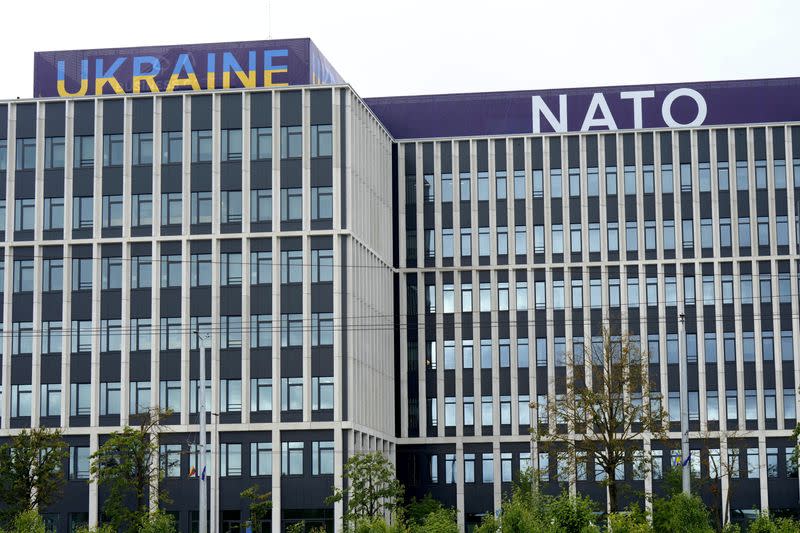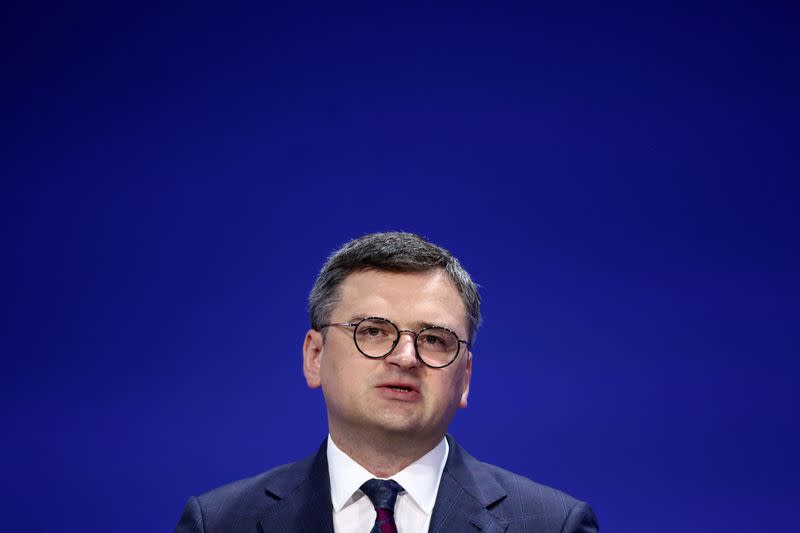NATO works to overcome divisions on Ukraine membership path
- Oops!Something went wrong.Please try again later.
By Andrius Sytas, Sabine Siebold and John Irish
VILNIUS (Reuters) -NATO members sought to overcome divisions over how to put Ukraine on a path to membership on the eve of Tuesday's start to a summit in Lithuania, apparently removing one hurdle to Kyiv joining the alliance.
NATO Secretary General Jens Stoltenberg said he had put forward a package that included the removal of the requirement for a Membership Action Plan (MAP) - a list of political, economic and military goals that other eastern European nations had to meet before joining the alliance.
Ukrainian President Volodymyr Zelenskiy, who is expected to attend the summit, wants a clear invitation to join the alliance after Russia's war on Ukraine ends, and security guarantees until that time.
Officials working to agree wording for the summit communique acceptable to all of the alliance's 31 members made progress on Monday, raising hopes that agreement would be reached when talks resume on Tuesday, according to diplomats.
"I am absolutely certain that we will have unity and a strong message on Ukraine," Stoltenberg told reporters in Vilnius on Monday.
Ukrainian Foreign Minister Dmytro Kuleba tweeted that there had been a consensus among allies to drop MAP, but added: "It is also the best moment to offer clarity on the invitation to Ukraine to become (a) member."
NATO members in Eastern Europe, under Moscow's thumb for decades in the last century, have backed Kyiv's call for a clear path to membership. NATO was formed in 1949 with the primary aim of countering the risk of a Soviet attack on allied territory.
Others, such as the United States and Germany, have been more cautious, wary of any move that they fear could draw NATO into a direct conflict with Russia, and potentially spark a global war.
Assertions that "Ukraine's rightful place is in NATO" and that it will join "when conditions allow" are among the phrases being discussed for the final text, diplomats say.
Some of Ukraine's eastern allies want the word "invitation" or "invite" to be included, with negotiations also focusing on what conditions Ukraine would have to meet to join NATO and how its progress should be tracked.
At a summit in Bucharest in April 2008, after much wrangling, NATO declared that both Ukraine and Georgia would join the U.S.-led alliance - but gave them no plan for how to get there.
President Vladimir Putin has cited NATO's expansion towards Russia's borders over the past two decades as a reason for his decision to send his armed forces into Ukraine on Feb. 24, 2022. NATO has said it is a defensive alliance that poses no threat to Russia.
MEMBERSHIP ON HORIZON
Speaking alongside Stoltenberg, Lithuanian President Gitanas Nausėda said a prospect of membership was extremely important to Ukraine, which had been "heroically fighting the Russian monster for almost one and a half years".
"We must avoid Ukraine membership ... becoming a horizon," he said. "The more you walk towards it, the farther it is."
Ukraine's largest Western backers were also still finalising a joint framework to enable long-term security assurances for Kyiv from individual allies, but may wait until after the summit to announce them - to make clear they do not come from NATO - European diplomats say.
One bone of contention was taken off the summit table on Monday evening when Turkish President Tayyip Erdogan agreed to forward to parliament Sweden's bid to join NATO after talks with Stoltenberg and Swedish Prime Minister Ulf Kristersson.
NATO allies also agreed on Monday regional plans detailing how the alliance would respond to a Russian attack, overcoming a Turkish blockage, three diplomats told Reuters.
The revival of the plans is a major shift as it is the first time NATO has drawn up such plans since the Cold War ended three decades ago.
(Additional reporting by Andrew Gray in Vilnius and Anna Pruchnicka and Kyiv Newsroom; Writing by John Irish; Editing by Timothy Heritage, William Maclean and Howard Goller)


